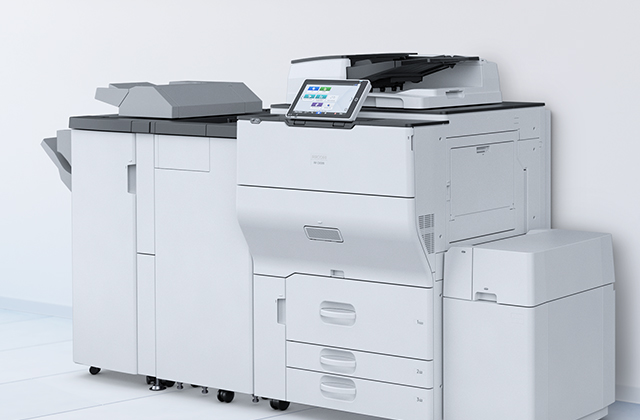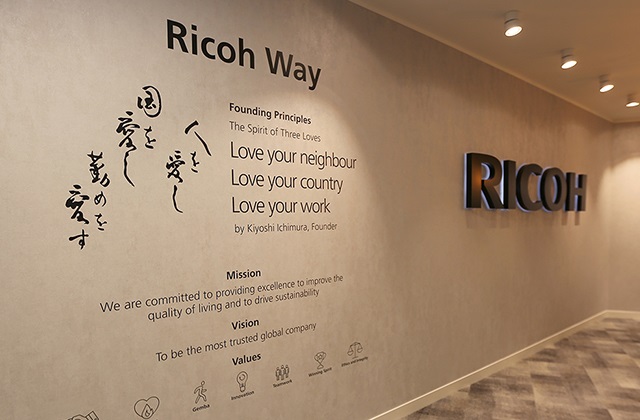Cutting the red tape for Silicon Europe to take centre stage
By David Mills, CEO, Ricoh Europe
Ricoh Europe, 18 November 2015 – If you were asked to name an innovative digital business today, the chance is a European organisation wouldn’t immediately spring to mind. Uber, Facebook, Apple and Google, as well as over half of the world’s Top 100 listed companies come from the US. And with the likes of Alibaba and Tencent, there’s also a show of increasingly strong Chinese competition1.
Despite rapid transformation and 59 per cent of European businesses now being ‘digital’ in one way or another2, it’s clear that the continent lags behind the global barometer. However, it’s not a lack of ambition which dampens the potential of many home-grown companies. In fact, a recent study of 1,360 business decision makers across 16 EU countries, commissioned by Ricoh Europe, found most European businesses (65 per cent) intend to expand to other countries in the continent over the next five years. Instead, it’s the complex web of rules and legislation that make navigating the single market particularly tricky.
Nevertheless, there is hope to overcome this roadblock which politicians, regulators and business people are all too aware of. The European Digital Single Market, a critical component of the EU Digital Agenda to be launched next year, is a welcome development which should level the playing field. Tackling issues such as geo-blocking, copyright laws and simplifying VAT rules, the digital single market will standardise regulations so that the same content, products and services will be available at the same price anywhere in the EU. With apps and downloads costing the same from Greece to Ireland, and Portugal to Finland, we should expect a huge uptake in cross-border ecommerce.
By massively reducing red tape in a traditionally complex market, the digital single market is an exciting chance for many European businesses to accelerate their growth at a pace to match their international rivals. Any trader, whether a single shop-keeper or a digital start-up based in the heart of London’s Silicon Roundabout with plans to completely reimagine our online lives, will be able to sell across the entire EU confident in the knowledge that the same rules for ecommerce apply everywhere.
The digital single market is estimated to make a contribution of €415 billion to the European economy4. As such, enabling companies to do business with an additional 500 million new consumers in one go can only be a good thing. The benefits expected by European businesses include reduced barriers to entry (52 per cent), greater profitability (50 per cent) and reduced operating costs (48 per cent)5. All of these are within easy grasp of businesses willing to embrace arguably the biggest change to European regulation in recent years.
So what are the next steps? By starting to streamline, digitise and standardise their processes, forward-thinking European businesses will be in good shape to develop a distinct competitive advantage – a necessary step if Europe is going to take its spot on the global stage.
Firstly, organisations need to audit their current processes for operating across borders to help them understand their position in the changing landscape. Secondly, with the audit complete, organisations can focus on enhancing the ways in which they work to be more efficient in a larger, multi-lingual, market. Here, the standardisation of systems to drive cost-savings and boost productivity is key. Lastly, they shouldn’t be afraid to approach expert help in the form of consultancies and partners who already have the knowledge of what it takes to grow internationally and are able to advise based on their experience.
With the number of firms trading in only one country to shrink from around half of European businesses today to just 21 per cent in 20206, the introduction of a digital single market is a genuine hope for the continent. With a digital presence now able to put every company within reach of millions of new customers, the only limit to innovation is our imagination. If all goes according to plan, the next digital giant could as easily be a start-up in Paris, Berlin or London as it could be in San Francisco, Shanghai or Beijing. So let’s roll out the red carpet and cut the red tape to welcome Silicon Europe!
1. PwC, Global Top 100 companies – 2015 update
2. http://ec.europa.eu/growth/sectors/digital-economy/importance/index_en.htm
3. Ricoh Europe: Digital Marketplace – Hope or Hype?
4. http://ec.europa.eu/priorities/digital-single-market/
5. Ricoh Europe: Digital Marketplace – Hope or Hype?
6. Ricoh Europe: Digital Marketplace – Hope or Hype?
| Over Ricoh |
Ricoh creëert digitale werkomgevingen door het gebruik van innovatieve technologieën en diensten die mensen in staat stellen slimmer te werken, vanwaar ze zich ook bevinden.
In de loop van zijn 85-jarige geschiedenis bouwde Ricoh een gecultiveerde kennis en organisatorische capaciteiten uit. Dat maakt van het bedrijf een toonaangevende leverancier van digitale diensten, informatiebeheer en print- en beeldvormingsoplossingen die zijn ontwikkeld om digitale transformatie te ondersteunen en bedrijfsprestaties te optimaliseren.
Het hoofdkantoor is gevestigd in Tokio, maar de Ricoh Group heeft belangrijke vestigingen over de hele wereld en haar producten en diensten bereiken vandaag klanten in ongeveer 200 landen en regio's. In het boekjaar dat eindigde in maart 2022 behaalde de Ricoh Group een wereldwijde omzet van 1.758 miljard yen (ongeveer 14,5 miljard USD).
Ga naar www.ricoh.be voor meer informatie.
© 2023 RICOH COMPANY, LTD. Alle rechten voorbehouden. Alle productnamen waarnaar wordt verwezen zijn handelsmerken van hun respectieve bedrijven.












